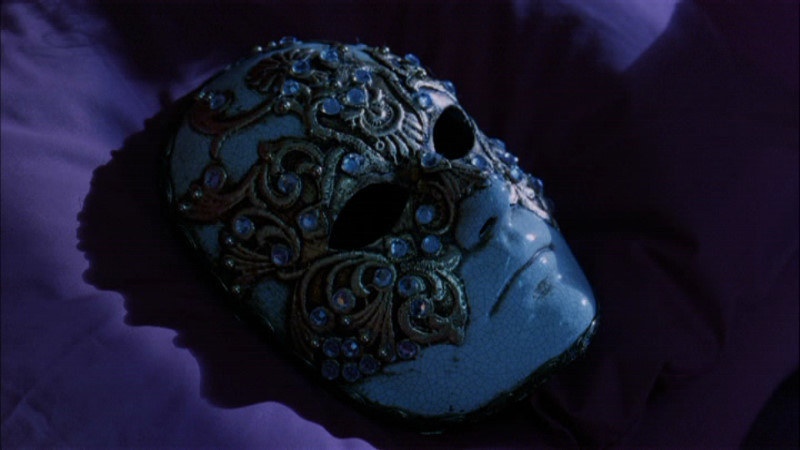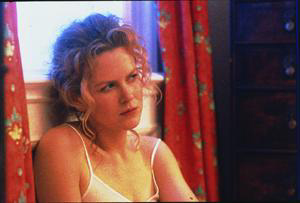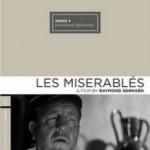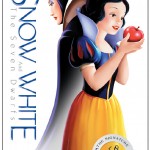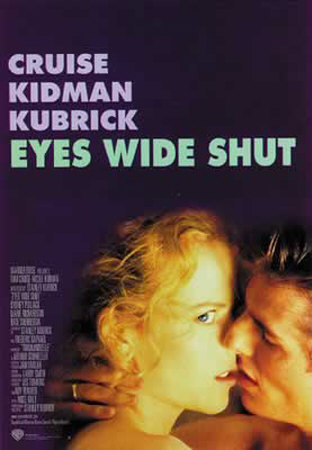 1After a night of flirtations at an upscale Christmas party, a doctor’s wife (Nicole Kidman as Alice Harford) confesses a sexual fantasy to her husband. Unable to cope with her revelation, the doctor (Tom Cruise as Dr. William Harford) seeks to act out sexually, gradually finding himself in more decadent and dangerous situations. Rated R for frank sexuality, graphic nudity, drug use, language and adult situations. WARNING: The following review contains some plot spoilers.
1After a night of flirtations at an upscale Christmas party, a doctor’s wife (Nicole Kidman as Alice Harford) confesses a sexual fantasy to her husband. Unable to cope with her revelation, the doctor (Tom Cruise as Dr. William Harford) seeks to act out sexually, gradually finding himself in more decadent and dangerous situations. Rated R for frank sexuality, graphic nudity, drug use, language and adult situations. WARNING: The following review contains some plot spoilers.
What’s Good and Bad About It?
One of the differences between art and pornography is that art demands more from you as a viewer. With pornography, the viewer remains in part detached from the experience so as to vicariously control the fantasy, but a substantial part of art is communication. Good art might make intellectual or emotional demands upon you that you wish it wouldn’t, but if you submit to the artist’s vision and grapple with it, you can get something out of it beyond merely a physical reaction. Stanley Kubrick, more than just about any other great cinematic director, had the ability to instill a mesmerizing quality to his films. You don’t just watch Kubrick films, you experience them. By the end of Eyes Wide Shut, I was drained physically and emotionally, but I didn’t feel cheap or angry the way I did after seeing movies like Rising Sun or The General’s Daughter, that exploit sex and the power of sexual images for what are clearly intended to be entertainment pieces, not art.

Eyes Wide Shut has sex in it, more than a lot of viewers are going to be comfortable with. But it doesn’t simply use sex to sell an entertainment piece, it depicts sex because that is one of the things it is about. The opening shot of the film is of Alice Harford stepping out of her dress and standing fully nude, her back to the camera, while the soundtrack plays the opening credits. I think going with the nude shot right off the bat actually lessens the erotic content. Pornography is as much about anticipation as it is voyeurism, about savoring the temptation leading up to the actual moment of lust. There is no fake coyness to the movie, a fact which I found made it less erotic. Its treatment of nudity reminded me (seriously) of Peter Bogdonavich’s treatment of Rocky, the physically disfigured protagonist in the movie Mask. Recognizing that certain images are going to be powerful because of their very nature, he shows us a close up of Rocky’s face right off the bat so we can have our shock and get on with the movie. So too, here. Those who just want to see Nicole Kidman naked get their peep and needn’t stay past the first ten seconds. One subject of the movie, announces the opening shot, is sex. Accept it as a subject and be willing to grapple with the film’s message, or reject the whole film, not just the physical depictions of nudity. But don’t accuse it of using the sex gratuitously.
I do not want to give the impression, however, that Eyes Wide Shut is only about sex. Most great films are about more than one thing. The film is also about marriage, inhibitions, original sin, power, responsibility, and a host of other things. For some people, the fact that it is about sex will disqualify it. My wife (a visual artist) and I have an ongoing question that we grapple with as Christians: what role can/should the human body in general and the nude in particular play in the visual arts? Some Christians will answer that it has no place, and for them any discussion of the context of how it is used will be extraneous and irrelevant, vain attempts to justify that which is better left unportrayed. Others will say it depends on the artist’s intent or perhaps even the viewer’s. For them, I offer an opinion: Eyes Wide Shut is art, not pornography, and Kubrick uses his story and images, including those dealing with sex, in the context of an artistic message that is not necessarily antithetical to Christian values.
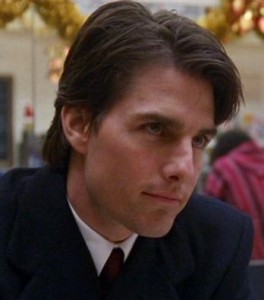
Within this challenging context lie several messages or themes that are compatible with a Christian world view. I will offer two that it made me consider: the destructive power of sins of the imagination as well as sins of the body, and the ability of the sexual revolution to numb a conscience but never totally destroy it. That sins of the imagination are important is a truism that I think the Christian community would assent to, but often in the form of lip service. Yes, Jesus meant it when he said that for a man to look at a woman with lust in his heart is to commit adultery, but many Christians have a difficult time applying that truth in a relevant manner. One common application of this teaching I see is an attempt to remove oneself from all objects that might prompt imaginative lust. Yet such is the fallen nature of our minds that even the most innocuous or innocent experiences and images can be turned into grist for illicit fantasy. Martin Luther said that we can’t keep the birds from flying over or heads, but we can keep them from nesting in our hair. Sometimes we find it is hard work to live with Biblical commandments on a daily basis and search for ways to make the one great renunciation (I won’t watch movies, go outside, etc.) rather than incorporating the teaching into our daily lives. Other Christians I know, while they would perhaps not articulate their belief so crudely, act as though the inability to prevent the birds from flying overhead means that they are only responsible for sins of the flesh and not those of the imagination. I mentioned in my plot summary that William finds himself in progressively more decadent situations. Too many men, even Christian men, will compartmentalize fantasy lives and reality to the extent that they feel safe sinning in the imagination, oblivious to its effects on their character. Like the junkie he warns at the Christmas party, William blithely thinks he is in control of himself and the situation. When he arrives at what he expects to be an orgy he tells the cab driver he “may only be 10 minutes.” He does not see that those who capitulate to sin in their minds or imaginations will find it increasingly difficult to abstain in the flesh. So the film condemns as naive a literal morality that cares only about physical sin. How many have fallen into sin by allowing themselves to get close to it in the vain belief that when the important boundary or temptation comes they will have the power and discipline to refrain from temptation, only to find themselves saying, “I never meant for things to go this far,” or asking, “how did I end up here?” The answer is one step at a time, and a little compromise before a big one.
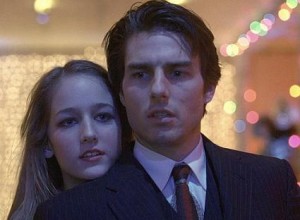
And yet the film is more than merely a cautionary tale about sin leading to greater sin. To me, one of the great ironies of Eyes Wide Shut is that neither William nor Alice commits adultery in the flesh, a fact that ought to make them (who knows, perhaps does make them) more acceptable role models2 in the eyes of some more literal-minded conservative family value critics than a host of married couples in PG-13 rated movies. There is, of course, a ton of ambiguity as to why they don’t commit adultery; in fact the question as to why William is unable (unwilling?) to consummate his adulterous thoughts became, for me, the key question to answer in order to figure out what the movie was about. They do not simply refrain from adultery out of a conviction that to do so would be wrong, though I would argue vehemently that such a conviction does influence their decisions, even though they do not profess to be Christians. Yet in spite of the fact that William has not acted out sexually by the end of the film, he has paid the price morally for his desire to do so. At the end of the movie Alice says they should “maybe” consider themselves lucky that they have “survived” their adventures, real and imagined. Yet the viewer sees the truth that they (William especially) have been hurt by his attempts to have adulterous sex, even though he was unsuccessful. The movie is actually more demanding than some sermons I have heard because it recognizes that sexual purity is something more than physical abstinence.
Another challenging aspect, from a Christian perspective, are hints the movie drops in Alice’s dream and her last line that she has actively sought for her husband to sin in his imagination as a means of foreplay, to shock or coerce him over his inhibitions so that he will be better able to provide her with erotic sex. If that sounds like a reversal of traditional gender stereotypes, it should. Alice’s confession of her sexual fantasy comes when she is allegedly stoned on pot and angered by her husbands rather lamely argued stereotype that women don’t want sex. But she hardly smokes enough to get stoned3, and a previous scene in which she exaggerates the effects of alcohol at a party suggest that she might be using the marijuana and booze as excuses to act and speak in ways more frank than might otherwise be countenanced by her society. If you read the film as I do, that Alice is instigating and manipulating the situation, you are forced to confront a whole slew of questions that are very pertinent to Christians, but that many Christians won’t discuss. Evangelical Christianity has no shortage of books or teachings about the impropriety of premarital or extramarital sex, but a surprising paucity of honest discussions about the correct role of sex within marriage. The film might prompt intelligent Christians to contemplate questions that rarely get addressed from the pulpit: What are the limits (if any) of sexuality within marriage? Can a man or a woman illicitly lust after his or her spouse? If fantasizing about another man makes me a better lover for my husband, or if I think telling him about it makes him a better lover for me, is that adultery? The film’s answer is, in my opinion, yes, which is part of why I believe Eyes Wide Shut is more traditional in its attitude towards sex than many Christians will realize. In the hands of a less honest director, or in a different movie, Alice would be the Christian husband’s greatest fantasy, a wife more sexually liberated than her husband who can spice up their sex life guilt free because whatever passion is stirred up in their fantasies can be acted out in the marriage bed. The truth (perhaps too painfully discovered for some Christian men) is that when those fantasies are in their nature contradictory to Biblical principle (such as when they involve another person or physical pain) they are not legitimated by the fact that they are only enacted between husband and wife. Jesus’s definition of adultery was lusting after another in your heart, an action which can be done while having sex with a spouse as easily as it can be done miles away. By demonstrating that some fantasies are innately harmful, Eyes Wide Shut demonstrates the inadequacy of a “consenting adults” argument. Can any human ever consent to be sinned against in a way God has forbidden? I am not saying here that William is aware that Alice is manipulating him in order to add a new dimension to their sex life. I think Cruise plays him as slightly befuddled, honestly not knowing what to make of his own desires, much less hers. But I am saying that the shame, pain and humiliation he feels at his own fall, as metaphysical as it is, damages him spiritually and emotionally more than Alice realized it would, and forces her to confront the possibility that illicit sex may not be what he wanted or what all men want.
The film’s co-writer, Frederic Raphael, has suggested that one of the things Eyes Wide Shut is about is how Kubrick’s generation “missed out” on the sexual revolution. In this reading, William would stand for Kubrick and his generation who watched taboos being smashed all around them, but could never quite “overcome” the sexual mores of a different time and place. It is an interpretation of the film that has merit, even though it renders William’s abstinence a result of fear and conditioning rather than virtue. Such reasons for abstinence are hardly passé, though. As the movie rightly shows, the shadow of AIDS has ensured that the current generation has as much, if not more, to fear from the laxening of sexual morality as did its grandfather’s generation. Here again, the film has insights that are compatible with Christianity. Cruise is an actor from the generation that grew up after the sexual revolution. As a cultural snapshot, it is interesting to see an actor who came to public fame with a film, Risky Business, that celebrated the smashing of sexual inhibitions as being emotionally liberating and healthy, now starring in a film that suggests ignoring some of those same inhibitions can be emotionally and physically suicidal. Guilt and shame were supposed to be by-products of an obsolete Christian morality, perhaps insurmountable in my parent’s generation, because they were too deeply ingrained, but which would disappear as “generation x” was assured from day one that there was nothing to feel sinful or guilty about in their sexual fantasies. Thirty or so years of Playboy Centerfolds, MTV videos and Dr. Ruth columns bombarding us with the message that sex is good, and the freer the better, have not succeeded in liberating us from that pesky little conscience that says, “yes, but only when you follow the rules.”
 I have already mentioned that William feels guilt and shame at his fantasies, but we are shown, in a critically important scene, that Alice does as well. William comes home to find Alice having a nightmare. She has dreamt that she is in a garden, naked and unashamed (sound familiar?). Eventually the man from her earlier sexual fantasy (the tempter?) enters her dream and looks at her naked and laughs at her. Her humiliation causes her to want to hurt someone, and so she has sex with as many different men as she can in her dream. Her husband sees her and she begins to laugh at him in contempt. When she wakes, the dream is too seamy for her. She is no longer in the fun world of her previous erotic fantasy, but in a darker dream revealing a depth of depravity in her own being that is not innocent, harmless or pleasurable. Earlier, I mentioned I rejected the interpretation of Alice’s confessional scene which said that pot and alcohol allowed repressed desires to be expressed. It seems to me what the movie is trying to say is that what is really being suppressed in Alice is her conscience. Like all things we try to suppress, it manifests itself in the subconscious (her dream). The title Eyes Wide Shut and Alice’s final speech draw our attention to the question of whether the imaginative fantasy world is consequential to our emotional and spiritual well being, or only the daily carnal world. By now the answer should be clear in a way that reveals what I mean when I say that the film has an essentially moral theme: our thoughts, our fantasies, our imaginations are every bit as important and in need of redemption as our physical bodies. And no amount of sexual saturation can ever silence the truth written on our hearts that our bodies, as well as our souls, were made for a purpose.
I have already mentioned that William feels guilt and shame at his fantasies, but we are shown, in a critically important scene, that Alice does as well. William comes home to find Alice having a nightmare. She has dreamt that she is in a garden, naked and unashamed (sound familiar?). Eventually the man from her earlier sexual fantasy (the tempter?) enters her dream and looks at her naked and laughs at her. Her humiliation causes her to want to hurt someone, and so she has sex with as many different men as she can in her dream. Her husband sees her and she begins to laugh at him in contempt. When she wakes, the dream is too seamy for her. She is no longer in the fun world of her previous erotic fantasy, but in a darker dream revealing a depth of depravity in her own being that is not innocent, harmless or pleasurable. Earlier, I mentioned I rejected the interpretation of Alice’s confessional scene which said that pot and alcohol allowed repressed desires to be expressed. It seems to me what the movie is trying to say is that what is really being suppressed in Alice is her conscience. Like all things we try to suppress, it manifests itself in the subconscious (her dream). The title Eyes Wide Shut and Alice’s final speech draw our attention to the question of whether the imaginative fantasy world is consequential to our emotional and spiritual well being, or only the daily carnal world. By now the answer should be clear in a way that reveals what I mean when I say that the film has an essentially moral theme: our thoughts, our fantasies, our imaginations are every bit as important and in need of redemption as our physical bodies. And no amount of sexual saturation can ever silence the truth written on our hearts that our bodies, as well as our souls, were made for a purpose.
The Last Word (Overall assessment and Biblical quote)4
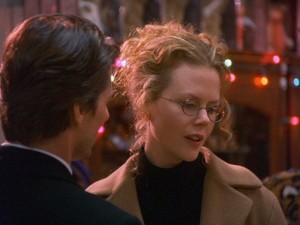
I started this review by saying that one quality of serious art is that it makes demands upon you. Whether those demands take the form of questions, observations or challenges, meeting them can be challenging, and so taking them on can involve risks. Of course there are risks involved with the staid complacency that refuses to hear any challenges, but we don’t often worry about those. Also, because art is communicative in nature, there are risks involved in evaluating it for someone else. Do not go see this film if you are convinced that the nude has no place in the visual arts or if you believe the risks involved in subjecting yourself to sexual images, even in an artistic context, are too great to justify whatever benefit you can hope to derive from a serious contemplation of adult subjects. Emotional and artistic sensitivity is nearly impossible to quantify or categorize, a fact that makes a ratings system such as “R” or “NC-17” essentially meaningless for screening a film’s adaptability, so I’m hesitant to say what I think are/should be the limits on who could benefit from the film. Certainly those who are particularly sensitive to sexual portrayals, either because of relative youth or inexperience, are not likely to get much out of the film. I know there was a time in my life when the film would have done more harm than good, because the images would have been so shocking and overpowering in comparison to what I had seen and experienced (or not seen and experienced) and because I lacked the life experiences to make what the film said about relationships in general, and marriage in particular, in any way meaningful. Having said that, I doubt seriously whether most Christians under 305, especially unmarried ones, would get much out of Eyes Wide Shut, not simply because it is erotic (most of them will have probably seen images as graphic on cable television or the internet), but because its subject matter is something that, if foreign to them, would make the best parts of the film inaccessible, thus making it cater, perhaps, only to the prurient interest. Others, however, who are willing to do the work demanded of them by art, who are willing to think about what the art tells them about our world and about themselves, could and should find much to praise in Kubrick’s final film.
My Grade: A
1–This essay is a revision of a post I originally made for my web site in 1999. Although one’s views and (I hope) writing gifts expand and change, I’ve tried to leave it fairly close to the original. I’ve cleaned up the proofreading errors a little and made a few minor changes.
2–“role models” is clearly the wrong word here. I think what I was getting at was that their conduct would or could be less offensive to those only caring about the letter of the law rather than the spirit of it.
3–I’ve never smoked marijuana. Since writing this review, I’ve been told by someone who has that this scene isn’t that incredulous, that good marijuana (which people of their socioeconomic class could have access to) can operate very quickly.
4–One of the revisions I’ve made is to remove the conceit of having to have a Bible verse incorporated with every review. That was more for the particular audience I was writing for at the time than something that added to the review.
5–This passage, too, strikes me in retrospect as covering my rear from questions coming from the community I was in at the time about how I could “endorse” such a film more so than what I actually thought or felt. At heart, I still believe the substance of what I said–which is that some viewers wouldn’t benefit from watching such a film–but I’m not sure that has as much to do exclusively with age as it does a host of other factors (previous art experience, upbringing, spiritual and emotional development, sexual history, etc.).

